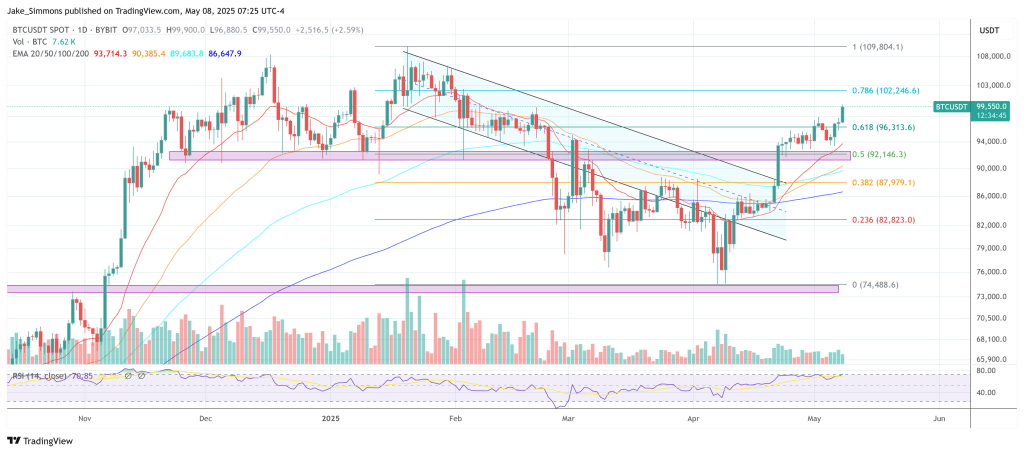Bitcoin is faster than most people expect: ‘Trump Advisor

In a conversation about the spoon, Bitcoin CEO David Bailey and U.S. President Trump’s confidant mapped a trajectory that he believes will make the world’s first cryptocurrency from insurgent technology to major reserves “much earlier than one might think.” Bailey described the convergence of political opportunism, sovereign-scale mining and balance sheets in a speech with host Frank Chaparro, which he believes is steadily eroding the old monetary order.
Bailey has no stimulating speech about transition scale. “We are on the road to Bitcoin becoming a world reserve asset,” he said, adding that the timeline is accelerating. This statement forms a discussion, from the newly discovered “Bitcoin President” role of U.S. President Donald Trump to Bhutan’s reliance on cumulative revenues, and SoftBank’s entry into the treasury inventory arbitrage game.
Bitcoin has become a reserve fund more than expected
Bailey recounts his first meeting with Trump at Trump Tower, where he and others try to fold Bitcoin into the president’s platform. He said the encounter revealed the instinct political antenna. Trump “has the ability to flip his role […] From joking and having fun […] To business Trump, decision-making time. “In Bailey’s narrative, it was originally a meme-driven overture that evolved into a reflective board: “Six months have passed, and now he is the president of cryptocurrency, he is the president of Bitcoin.” ”
Bailey believes this is important because the constituency is already significant in the election. “Crypto Americans […] He told Chaparro. Trump believes the cohort is “more enthusiastic, with more people among us than gun owners,” he said, with 90 million people, 80 million people. “This means that Bitcoin’s ideological goods “do not want political politics” and, as Bailey said, have begun to gain traditional muscle in the ballot box.
If politics provides narrative, energy provides cash flow. Bailey said sovereign mining has crossed a turning point, with an estimated “about 50 countries” now running public-private mining companies to take advantage of excess capacity. He believes that scale is no longer trivial: qualified countries “use over 100 megawatts of power”, some of which “use Gigawatts.”
The Himalayan Kingdom in Bhutan is a model of norm for Bailey. Now, Bitcoin mining there accounts for 50% of the country’s GDP […] It may even be higher. “He believes that this dependency turns hashrate exports into a pillar of fiscal solvency, but it can also compete with commercial miners, i.e. “The cost base without energy” for everyone else.
Bailey argues that sovereign accumulation naturally follows sovereign production. Once the government controls the block reward, internal issues move to custody, with sales and agency authorization retained.
While only El Salvador and the Central African Republic have publicly adopted Bitcoin as fiat currency or reserve assets, Bailey asserted that “sovereign funds are flowing in” [the] The Bitcoin market is already quite large,” some of which have routed through sovereign health funds rather than central banks.
He linked this process to an emerging framework for national security. “Is this a national security issue for your country [… ] Major reserve assets? Yes, absolutely. “He hinted that defense agencies have begun weighing whether Bitcoin is strengthening or undermining existing security doctrines, a debate he expects to surface in U.S. Congressional testimony later this year.
Policy templates
At the company level, Michael Saylor’s strategy remains a reference model. Bailey said Saylor’s script — which issued stocks or debt, bought bitcoin, and allowed the market capitalization of Premia to offset dilution — has been “widely spread everywhere.” According to his statistics, “we may launch 200” listed companies’ strategy differences; he plans to “hundreds” by the end of the year. Bailey believes the consequences of supply demand are transparent: “Bitcoin is slightly insufficient to meet this price. Prices will have to rise.”
This mechanism is not without systemic risks. Bailey compared the company-Bitty trading to a closed trust structure that once managed GBTC, while highlighting the crucial difference: if the operating company discounts, it can buy back its own shares. Even so, he warned that widespread stock loans could spread leverage in the stock market, making severe Bitcoin shrinkage a potential trigger for global double loading. “Bitcoin bear market may lead to financial contagion […] In fact, no one did anything to stop it. ”
Throughout the interview, Bailey returns to institutional vulnerability. “These institutions are weaker and more fragile than people appreciate.” However, fragility cuts down two ways: speeding up the leverage of Bitcoin’s rise and allowing the harm of reversal to reproduce. Despite this, Bailey’s bottom line is still clear. “us [ultimately] He said what is the future of the Fed. ” [Bitcoin’s] Inevitably. ”
At press time, BTC was trading at $99,550.

Featured Images created with dall.e, Charts for TradingView.com

Editing process For Bitcoin experts, focus on thorough research, accurate and impartial content. We adhere to strict procurement standards and each page is diligently evaluated by our top technical experts and experienced editorial team. This process ensures the integrity, relevance and value of our content to our readers.



